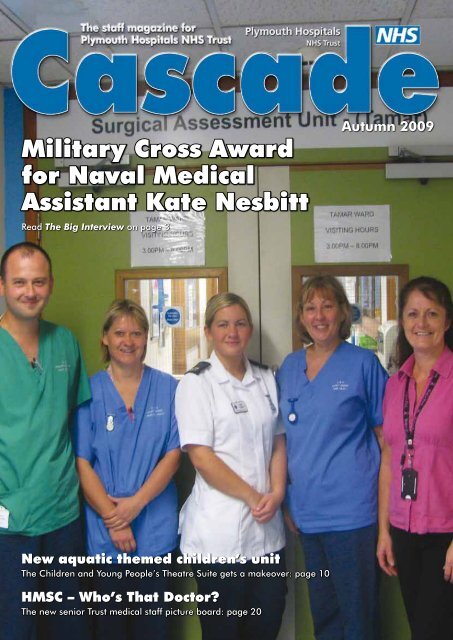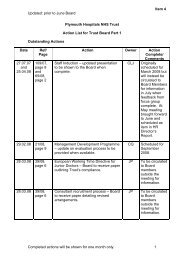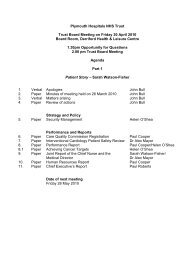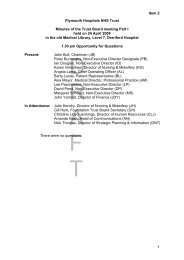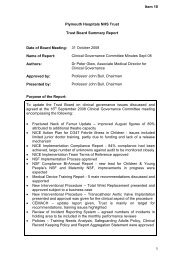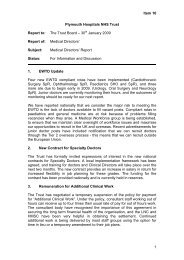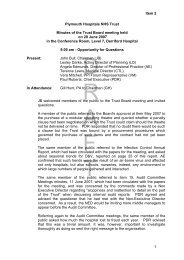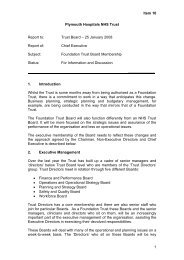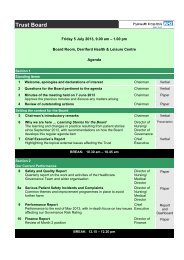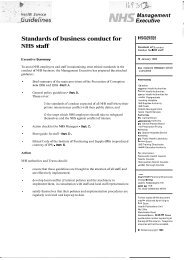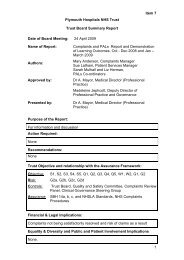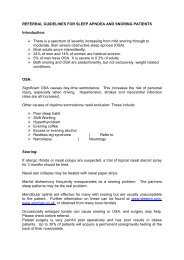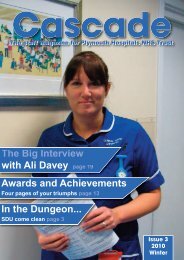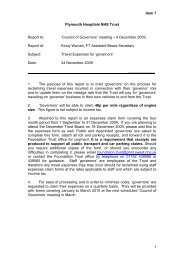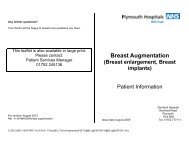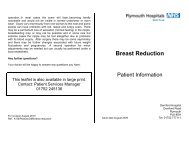Military Cross Award for Naval Medical Assistant Kate Nesbitt
Military Cross Award for Naval Medical Assistant Kate Nesbitt
Military Cross Award for Naval Medical Assistant Kate Nesbitt
You also want an ePaper? Increase the reach of your titles
YUMPU automatically turns print PDFs into web optimized ePapers that Google loves.
<strong>Military</strong> <strong>Cross</strong> <strong>Award</strong><br />
<strong>for</strong> <strong>Naval</strong> <strong>Medical</strong><br />
<strong>Assistant</strong> <strong>Kate</strong> <strong>Nesbitt</strong><br />
Read The Big Interview on page 3<br />
Autumn 2009<br />
New aquatic themed children’s unit<br />
The Children and Young People’s Theatre Suite gets a makeover: page 10<br />
HMSC – Who’s That Doctor?<br />
The new senior Trust medical staff picture board: page 20<br />
Cascade
IN THIS ISSUE<br />
Message from the<br />
Communications Team<br />
Cover photo: <strong>Naval</strong> <strong>Medical</strong><br />
<strong>Assistant</strong> <strong>Kate</strong> <strong>Nesbitt</strong> and<br />
the Surgival Assessment Unit<br />
team – see page 3<br />
If you would<br />
like to request<br />
this document<br />
in a larger or<br />
alternative<br />
<strong>for</strong>mat please<br />
contact:<br />
Laura Young<br />
Communications<br />
Officer<br />
T: 0845 1558207<br />
Ext: 52783<br />
E: Laura.Young@<br />
phnt.swest.nhs.uk<br />
The next issue is already a<br />
work in progress. If you have<br />
any ideas, stories and letters<br />
that you would like included,<br />
then please let us know in<br />
good time. We also welcome<br />
any suggestions on how<br />
you think Cascade could be<br />
improved.<br />
DEADLINE FOR<br />
NEXT EDITION:<br />
Friday 8th January 2010<br />
Design and print by<br />
Newton Print, Newton Abbot,<br />
Devon. Tel: 01626 368986<br />
www.newtonprint.co.uk<br />
Welcome to the Autumn edition of Cascade.<br />
As you can see from the front page, we have been privileged to be able to talk to <strong>Naval</strong><br />
<strong>Medical</strong> <strong>Assistant</strong>, <strong>Kate</strong> <strong>Nesbitt</strong> about being awarded the <strong>Military</strong> <strong>Cross</strong> <strong>for</strong> her conduct<br />
whilst on tour in Afghanistan. Check out her interview on page 3.<br />
As always, we are delighted to be able to acknowledge so many of you <strong>for</strong> your sterling<br />
work and achievements and to highlight the awards you have received <strong>for</strong> your ef<strong>for</strong>ts.<br />
Check out pages 6 and 7.<br />
Also in this edition, we find out interesting news from around the Trust, and highlight the<br />
importance of getting vaccinated against both seasonal and swine flu this year on page 17.<br />
We hope you enjoy reading this edition of Cascade and are perhaps thinking of ways in<br />
which you can appear in a future magazine. We would love to hear from you, so let us<br />
know what you are doing, what you have achieved or how you are raising money and we<br />
will do our very best to accommodate your stories. Get in touch soon though, as the next<br />
magazine is already filling up fast.<br />
Laura Young, Communications Officer, Editor<br />
Contents<br />
6<br />
10<br />
13<br />
3 The Big Interview<br />
<strong>Kate</strong> <strong>Nesbitt</strong> on being awarded the <strong>Military</strong> <strong>Cross</strong><br />
4 News from Around the Trust<br />
5 Specialities Around the Trust<br />
6 <strong>Award</strong>s and Achievements<br />
Celebrating personal and professional successes<br />
7 Charity Work and Fundraising<br />
8–9 Sharing Expertise<br />
Microbiology in the Community; Stereotactic<br />
Radiosurgery Workshop; Inaugural Global Spine<br />
Conference<br />
10 Children and Young People’s Theatre Suite<br />
A colourful aquatic makeover<br />
11 Did You Know?<br />
The Patients’ Discharge Lounge<br />
12–13 Events<br />
Highlighting recent and upcoming special events<br />
14 In Memory of... Marion Wheeler<br />
Car Leasing Scheme Update<br />
15 Listening into Action<br />
16 Fracture Clinic Makeover<br />
17 Flu Season<br />
In<strong>for</strong>mation on Seasonal and Swine Flu<br />
18 Retirements /<br />
Orthopaedic Mission to Kenya<br />
19 John Yarnold / Occupational Health<br />
20 HMSC – Who’s That Doctor?<br />
The new senior Trust staff picture board<br />
2 Autumn 2009 Cascade
<strong>Kate</strong> <strong>Nesbitt</strong><br />
THE BIG INTERVIEW<br />
<strong>Kate</strong> <strong>Nesbitt</strong>, a <strong>Naval</strong> <strong>Medical</strong> <strong>Assistant</strong> currently working on the<br />
Trust’s Surgical Assessment Unit (SAU), has recently been awarded a<br />
<strong>Military</strong> <strong>Cross</strong> on the Operation Herrick 9 Honours and <strong>Award</strong>s list <strong>for</strong><br />
her outstanding work whilst on a tour of duty in Afghanistan. <strong>Kate</strong> was<br />
attached to C Company, First Battalion the Rifles and is only the second<br />
woman in British history to be awarded the <strong>Cross</strong>.<br />
<strong>Kate</strong> received the award after she ran over 70 metres under heavy<br />
gunfire from Taliban fighters to help a badly injured soldier, LCpl Jon<br />
List. She treated LCpl List, who was choking to death after a Taliban<br />
bullet shattered his jaw, <strong>for</strong> over 45 minutes, opening a second airway<br />
so the soldier could breathe. The citation <strong>for</strong> <strong>Kate</strong>’s award reads:<br />
“<strong>Nesbitt</strong>’s actions throughout a series of offensive operations were<br />
exemplary; under fire and under pressure her commitment and courage were inspirational and made the difference<br />
between life and death.”<br />
Here Cascade talks to <strong>Kate</strong> about her experiences, how she feels about being awarded the <strong>Military</strong> <strong>Cross</strong> and how she<br />
feels her experiences on duty help her in her every day job on the SAU.<br />
You are quite young (21), how long have you been<br />
in the Navy and what made you decide to join?<br />
I’ve been in the Navy since I was 17, although I applied when<br />
I turned 16, and it took a year to get through the selection<br />
process. Everyone in my family, apart from my mum, is in the<br />
<strong>for</strong>ces. Both my dad and my brother are in the Marines and<br />
my auntie is in the navy so it felt really natural to follow in their<br />
footsteps.<br />
Why did you choose the role of <strong>Medical</strong> <strong>Assistant</strong>?<br />
When I was 12 we started to do different work experiences at<br />
school and I realised it was something I really wanted to do. My<br />
auntie is in the medical field in the navy as well so I was able to<br />
talk to lots of different people about what was involved. When I<br />
turned 16 I decided that the best way to pursue my career was<br />
by joining the Navy and it paid off!<br />
You have recently been told that you are being<br />
awarded the <strong>Military</strong> <strong>Cross</strong>, only the second woman<br />
to receive it, how did you feel when you were told?<br />
On the day I found out about the award, I had been on night<br />
shifts on the SAU. I was told to report to Commander Rick<br />
Stead (Commander Officer of the Ministry of Defence Hospital<br />
Unit) immediately after my shift ended. I was shocked when<br />
he told me I had been chosen to receive the <strong>Cross</strong>! It felt really<br />
<strong>Kate</strong> and her team on the Surgical Assesment Unit<br />
strange because the incident had happened over six months<br />
ago in the middle of an operation so I had expected it to have<br />
been <strong>for</strong>gotten about. I was just doing my job! I was so proud<br />
that the Army had thought me brave enough to be put <strong>for</strong>ward<br />
<strong>for</strong> the award especially because all the lads I worked with out<br />
there worked just as hard to keep me and the other medics<br />
safe. It is a real honour.<br />
What do you remember about the day you saved<br />
LCpl List’s life?<br />
It was a week long operation and I was the only medic. The<br />
ambush came out of nowhere and when I realised someone<br />
had been hit I just kept thinking about doing my job and saving<br />
a man down. When you are out there you just tend to get on<br />
with it!<br />
I do have a huge amount of respect <strong>for</strong> the lads in C Company.<br />
They really looked after me and the other medics the whole<br />
time we were with them and I can’t thank them enough. They<br />
really took us under their wing and this was really important to<br />
me, especially as it was my first tour.<br />
Do you think your experiences out in the field help<br />
you with your everyday job on SAU?<br />
Definitely. Being able to do my job under the worst conditions,<br />
such as under fire or without the correct equipment, in the field<br />
has made me so much more confident in my own abilities. It<br />
has also taught me how to improvise and has made me aware<br />
of what I can do under all sorts of pressure and in different<br />
situations. This has reflected in my work on the SAU. It has also<br />
made me appreciate a lot of things that I took <strong>for</strong> granted in the<br />
past, like having all the equipment you need to hand!<br />
I bet you have been kept quite busy since you<br />
found out about the award?<br />
The first few weeks were definitely a bit hectic! I was asked to<br />
do a lot of interviews with journalists, but it has quietened down<br />
quite a bit now.<br />
What is coming up <strong>for</strong> you now?<br />
Well, I am being presented the award <strong>for</strong>mally on Friday 27<br />
November by the Queen, which I am really excited about. I am<br />
taking my mum and dad along with me. I am also attending<br />
a lot of remembrance ceremonies over November, but apart<br />
from that I will carry on working with my team on the SAU at<br />
Derri<strong>for</strong>d.<br />
Cascade<br />
Autumn 2009<br />
3
NEWS FROM AROUND THE TRUST<br />
Learning Disabilities Patients<br />
Recent reports by Mencap in 2007, ‘Death by Indifference’<br />
and the report by the Parliamentary and Health Service<br />
Ombudsman report in March 2009, ‘Six lives: the provision<br />
of public services to people with earning disabilities’ has<br />
led to an increased awareness across the Trust about the<br />
care that we deliver to this group of vulnerable patients.<br />
Kevin Marsh, Deputy Director of Nursing, has been leading<br />
a multi-disciplinary group looking at the policy <strong>for</strong> patients<br />
within the Trust with learning disabilities. This group has<br />
included teams from the community, care providers and carers.<br />
The policy is now complete and has been cascaded to all<br />
departments ensuring that these patients are highlighted to<br />
Kevin on their admission, allowing appropriate support to be<br />
given to the patient, their carers and the clinical teams caring<br />
<strong>for</strong> them. This has led to an improved patient experience <strong>for</strong><br />
this group of vulnerable adults.<br />
The exciting news is that as a result of this group being <strong>for</strong>med,<br />
funding has been received <strong>for</strong> a learning disability nurse<br />
specialist to be based in the Trust to focus on this vulnerable<br />
group of<br />
patients and<br />
the care they<br />
need both in<br />
hospital and<br />
the community.<br />
This post<br />
has been<br />
successfully<br />
filled and<br />
<strong>Kate</strong> Ban<strong>for</strong>th<br />
started in post<br />
on November<br />
9th, joined by<br />
Lesley Smith<br />
who has been transferred from NHS Plymouth. Please contact<br />
Kevin Marsh or Linda Field (pictured) <strong>for</strong> further in<strong>for</strong>mation if<br />
you are interested in finding out more.<br />
An event to officially launch this new service has been planned<br />
<strong>for</strong> December 2nd – so please put this in your diaries.<br />
Devon Child Health moves into the 21st Century<br />
Plymouth’s Child Health In<strong>for</strong>mation Department, based at<br />
the Central Records Library, Bush Park, provides one of<br />
the most fundamental and well appreciated NHS services.<br />
They are one of four such departments that work closely<br />
together across Devon.<br />
This is a busy department. Since 1979 they have managed the<br />
recording of all planned health contact, from birth to aged 19,<br />
including the recording, scheduling and progress monitoring of<br />
vaccinations and immunisations <strong>for</strong> nearly two million children<br />
across all the GP practices and schools in Plymouth and South<br />
West Devon. This service will have impacted on nearly every<br />
family in the area.<br />
About a year ago, all four of the departments were faced with<br />
the prospect of their current computer systems being unable<br />
to function. The ‘Swift’ System, purchased in 1980, used black<br />
and white screens and didn’t even work with a mouse! In<br />
response to this, PCTs in Devon were brought together to fund<br />
a much needed and anticipated upgrade of the database and<br />
system. This innovative approach combines data from across<br />
Devon’s four separate child health in<strong>for</strong>mation departments into<br />
a single database <strong>for</strong> the first time, giving improved public health<br />
monitoring and planning <strong>for</strong> the whole county.<br />
Make no mistake, this first stage was no small project to<br />
plan, and work now continues to ensure the safe transfer,<br />
co-ordination and implementation across four acute trusts whilst<br />
all departments remain open throughout.<br />
Andy Vickers, the Devon Programme Manager, said: “As with<br />
Apollo 13, failure here wasn’t an option and everyone who has<br />
been involved in the Plymouth upgrade is to be congratulated<br />
<strong>for</strong> their commitment and hard work.”<br />
Catherine Murphy, Project Manager, has had her work cut out<br />
to plan and co ordinate the smooth switchover of the multiple<br />
sites. In mid September, Plymouth was the first site to go live<br />
and suppliers and users alike have written to thank the local<br />
team <strong>for</strong> their ef<strong>for</strong>ts in ensuring the upgrade (which took place<br />
across one weekend) went as smoothly as it did. This is an NHS<br />
IT project that is currently on budget and on time.<br />
4<br />
Work is already underway in the remaining three areas. Torbay will<br />
be the next to implement the new system in mid November, Exeter<br />
in January 2010 and last, but not least, Barnstaple will go live at the<br />
end of March. The Plymouth team will support their colleagues on<br />
the other sites, as they become “live” on the new system.<br />
Now that all the stress and tension of the switchover is over,<br />
Katharine Jacobs, Manager of the Plymouth service said: “This<br />
long awaited replacement system has been implemented with<br />
the minimum of fuss. This is due to the huge amount of planning<br />
and work carried out by the project implementation team, the<br />
staff here at Plymouth and the software suppliers, McKesson”.<br />
The Child Health team now have the chance to continue to provide<br />
their essential service and to use some of that new technology to<br />
develop services to benefit GP Practices, Public Health and the<br />
wider health community well into the coming decade.<br />
Autumn 2009 Cascade
SPECIALITIES AROUND THE TRUST<br />
End of Life Care in the Emergency Directorate<br />
Having worked in Emergency<br />
Medicine and Intensive Care <strong>for</strong><br />
over five years staff nurse Hannah<br />
Heayn has covered many aspects<br />
of care of the dying patient, from<br />
the care of the expected and<br />
planned death to the traumatic and<br />
sudden deaths of both adults and<br />
children.<br />
The process of providing a dignified<br />
and symptom-free death remains<br />
the same in any environment and<br />
the Liverpool Care Pathway is a<br />
tool that assists with this. The challenges that the Emergency<br />
Department faces on a daily basis, means that the team has<br />
a vast experience in dealing with sensitive situations, involving<br />
patients and their relatives in the decision-making process that<br />
accompanies end of life care.<br />
Hannah has been working extensively with the Clinical Nurse<br />
Specialist <strong>for</strong> Palliative Care, The End of Life Committee,<br />
Paediatrics, Critical Care and Operational Support and her<br />
message is clear:<br />
Vulnerable Adults<br />
Ali Davey is the Emergency Directorate’s (ED) Clinical Nurse<br />
Specialist <strong>for</strong> Vulnerable Adults. Here she tells Cascade<br />
more about her role.<br />
My role entails scouring the directorate via databases and word<br />
of mouth <strong>for</strong> patients who have complex needs due to difficult<br />
social and health circumstances and also those who suffer<br />
from domestic violence. I particularly look out <strong>for</strong> patients with<br />
mental health problems, carers, isolated elderly and those that<br />
live within residential and nursing homes. I work in partnership<br />
with Devon & Cornwall Police and other strategic agencies<br />
with regard to domestic violence and I am currently working<br />
on Pathways to help identify and support victims of all violence<br />
whether it be domestic, alcohol or health-related.<br />
During my 16 months in post, one of my biggest achievements<br />
is the implementation of a Concern Pathway called ERIC (Early<br />
Recognition of Immediate Concern) which the ED staff complete<br />
to alert receiving wards that there is a health and wellbeing<br />
Alcohol Hospital Liaison<br />
The alcohol liaison post is funded by the PCT and came<br />
about after a needs assessment was undertaken around<br />
the Plymouth alcohol strategy and the close working<br />
relationship of the hepatology department.<br />
Louise Dunn, Alcohol Hospital Liaison Practitioner, is part of the<br />
hepatology specialist nursing team, within the gastroenterology<br />
directorate. Her role is to emphasise the dangers of drinking<br />
alcohol to patients drinking at hazardous levels, be<strong>for</strong>e the onset<br />
of alcohol-related harm, as well as the patients with significant<br />
liver disease. The Alcohol Hospital Liaison Practitioner role<br />
includes:<br />
l Highlighting to staff the patients who may require alcohol<br />
interventions<br />
l Giving advice on significant alcohol related health problems<br />
and those at risk of withdrawal symptoms<br />
l Alcohol screening<br />
l Giving assistance with medical management <strong>for</strong> withdrawal<br />
symptoms<br />
“I have become aware of how hard everyone is working across<br />
the Trust and in the community to initiate change and improve<br />
the quality of End of Life Care.<br />
“Our vision <strong>for</strong> the future in the Emergency Directorate and<br />
across the Trust is to bring about a change in access to high<br />
quality care <strong>for</strong> all approaching the end of life, irrespective of<br />
age, gender, ethnicity, religious belief, diagnosis or care setting,<br />
and which respects each individual’s needs and preferences.<br />
“We as a Trust must share our good practise and highlight<br />
where care and communication has been of a high standard.<br />
We also need to support one another in the care of these<br />
patients and relatives, to be able to pull together our resources<br />
and provide a seamless, safe and efficient environment.<br />
“We must ensure that while we care <strong>for</strong> one another we<br />
appreciate what a huge privilege it is to be part of someone’s last<br />
moments, to gently touch or hold a hand, to offer reassurance or<br />
allay fear, to speak softly or share silence. This is the greatest gift.<br />
“Thank you to all staff who make the care of the dying patient<br />
paramount, you have provided people with the very best and<br />
last care we can offer.”<br />
issue that needs addressing, prior to discharge. I then oversee<br />
the process of integrating these identified patients into the<br />
appropriate agency. This process has had a huge impact on<br />
the length of stays, returning patients and the support offered<br />
to those patients be<strong>for</strong>e they are discharged. I am privileged<br />
enough to stay clinically active, alongside my colleagues, in a<br />
supportive and hands on role and have built up some fantastic<br />
working relationships. Although I only work in the Emergency<br />
Directorate at the moment, I am always happy to offer Trustwide<br />
colleagues advice and support and am willing to visit any<br />
wards if needed.<br />
Alongside this I have also been teaching the SHOs and other<br />
nursing and medical staff domestic violence issues, vulnerable<br />
adult awareness and carer fatigue needs. This has been<br />
welcomed across the directorate and I would like to expand this<br />
in the future.<br />
l Assessment of severity of dependence<br />
l Delivery of brief interventions<br />
l Relapse prevention<br />
l Signposting patients to other community services.<br />
Louise’s role also includes working closely with other<br />
multidisciplinary team members such as, Vulnerable Adults,<br />
Safeguarding Adults, Care Planning, Safeguarding Children,<br />
Psychiatric liaison, the Discharge team and many communitybased<br />
alcohol services.<br />
When talking about her role, Louise said: “As a consequence<br />
of this role, I have developed a close working relationship with<br />
Harbour drugs and alcohol treatment teams. This enables a<br />
smooth transition between hospital and community and ensures<br />
effective continuity of care.<br />
“If you have a patient on your ward that has been identified as<br />
drinking at hazardous levels you can contact me on extn 39963,<br />
Bleep 89174 or via email on Louise.dunn@phnt.swest.nhs.uk”<br />
Cascade Autumn 2009<br />
5
AWARDS & ACHIEVEMENTS<br />
Outstanding Foundation <strong>Award</strong> Winners<br />
The Outstanding Foundation <strong>Award</strong>s <strong>for</strong> the Trust’s F1 and<br />
F2 doctors took place on recently at the Plymouth <strong>Medical</strong><br />
Centre.<br />
These awards are given to the trainees who have per<strong>for</strong>med<br />
above and beyond the call of duty and are nominated by<br />
H H H H<br />
Outstanding F1 Winner Rachel Clancy, Adrian Dashfield<br />
– Director of Postgraduate <strong>Medical</strong> Education, Highly<br />
Commended F1 Robert Rigley<br />
Outstanding F2 Winner Eyston Vaughan-Huxley, Adrian<br />
Dashfield – Director of Postgraduate <strong>Medical</strong> Education,<br />
Highly Commended F2 Katie Williams<br />
their peers, being judged on their per<strong>for</strong>mance, abilities and<br />
portfolios. Congratulations to this year’s winners:<br />
Outstanding F1 – Rachel Clancy; Highly Commended – Robert Rigley<br />
Outstanding F2 – Eyston Vaughan-Huxley; Highly commended<br />
– Katie Williams<br />
Staff Achievement – Anne-Marie Hookway, Estates<br />
Anne-Marie Hookway from the Trust’s Estates Team,<br />
took part in an eight-week trip to help in an orphanage<br />
in Sri Lanka earlier this year. Here she writes about her<br />
extraordinary experiences:<br />
After a very long journey to reach the Orphanage at Sister’s<br />
Blessed Virgin in Gampola, Sri Lanka, I arrived late in the<br />
evening after driving through the most beautiful, luscious<br />
countryside. I was lucky to be able to spend my first week<br />
with Liz (a volunteer who had been there since January). She<br />
showed me around and gave me much valued in<strong>for</strong>mation on<br />
how the place was run and what would be expected of me.<br />
With my own children being in their late teens I <strong>for</strong>got how<br />
loud a lot of children can be. But they were all so lovely and<br />
greet you all the time by calling you aunty. The youngest girl at<br />
the orphanage was just four months and the oldest was 19.<br />
The older girls were so sweet and always so helpful, while the<br />
gorgeous little ones wanted lots of cuddles and attention.<br />
I will always remember being woken up on my first morning<br />
around 6 am to hear children singing so beautifully and my day<br />
usually started with breakfast at 7.30 followed by:<br />
l English with the older girls<br />
l An hour helping in one of the 6 Montessori Classes<br />
l English with the Novice Nuns<br />
l Computers with the older girls or sometimes play and feed<br />
the little ones<br />
l Lunch and rest/ own time<br />
l Afternoon tea with the Nuns<br />
l English with the 11–16 yr olds<br />
l Play with toddlers and put them to bed<br />
l 6.30 pm – Answer telephone while Nuns were in evening<br />
prayer<br />
l Supper<br />
l English<br />
with Sister<br />
Rose<br />
l Bed at<br />
9.30<br />
The Nuns<br />
and Novices<br />
at the<br />
orphanage<br />
were so<br />
lovely and<br />
jolly with<br />
nothing<br />
being too<br />
much <strong>for</strong><br />
them. They<br />
Anne-Marie with some of the toddlers at<br />
the orphanage<br />
really show great dedication <strong>for</strong> their vocations with the love<br />
they give to all the children of Sri Lanka, each other and the<br />
support they showed to me.<br />
It was Easter Holidays halfway through my visit and most of<br />
the children went home <strong>for</strong> as long as they could. The Convent<br />
at the same time held a yearly retreat with a lot of Nuns<br />
coming from all over the Island <strong>for</strong> the week. During that week<br />
Sister Chandima and myself took seven children aged between<br />
6 – 9 to a smaller convent further up in the hills as a mini<br />
holiday with lots of walks.<br />
I will always value the opportunity of being able to take part<br />
in the Easter celebrations (I have never seen so many people<br />
celebrating mass over the four days). How well behaved the<br />
smaller children were sitting still and quiet <strong>for</strong> so long.<br />
The only regret I have is being a complete novice to<br />
volunteering and coming away feeling I could have done better.<br />
Having experienced it now I would love to go back and help<br />
more in the future.<br />
6 Autumn 2009 Cascade
H H CHARITY H H H H WORK H H H & FUNDRAISING<br />
H H H H H H<br />
Post Office Workers Leap <strong>for</strong> Jeremiah’s Journey<br />
On the 12 September, Dave<br />
Boyes, Tony Tamblin and<br />
Neil McCloy, three of the<br />
Trust’s Post Office workers<br />
took to the skies in a charity<br />
sky dive to raise money<br />
<strong>for</strong> Jeremiah’s Journey,<br />
the Derri<strong>for</strong>d based charity<br />
that offers support and<br />
in<strong>for</strong>mation to children and<br />
their families when someone<br />
special dies.<br />
Tony said: “All three of us<br />
know someone who has been<br />
helped by Jeremiah’s Journey<br />
so we thought it would be a<br />
good way to raise money <strong>for</strong><br />
the charity.”<br />
The dive took place at<br />
Dunkeswell Airfield and was a<br />
tandem skydive from 15,000<br />
feet. All three of the divers<br />
admitted to being scared<br />
be<strong>for</strong>e they went up especially<br />
Tony who had never been in<br />
a plane be<strong>for</strong>e! However, as Neil McCloy, Dave Boyes and Tony Tamblin<br />
Dave states: “Although it was<br />
scary at first, we were only freefalling <strong>for</strong> about one minute be<strong>for</strong>e the parachute was released. Then we had about five minutes to<br />
take in the scene be<strong>for</strong>e landing.”<br />
Neil added: “We were really lucky with the weather, it was completely clear blue skies and we were able to see both the English and<br />
Bristol Channels.”<br />
The team managed to raise over £500 <strong>for</strong> Jeremiah’s Journey and had over 30 pages of sponsorship from friends, family and staff<br />
around the Trust and would like to thank everyone who sponsored them.<br />
Sky divers take to the skies <strong>for</strong> the<br />
Chestnut Appeal <strong>for</strong> Prostate Cancer<br />
After a false start, two weeks prior, when the weather<br />
closed in on Perranporth Airfield – on Saturday 29th<br />
August the first of the Chestnut Appeal’s sponsored sky<br />
divers took to the skies.<br />
Barbara Hambly, PA to Mr Butcher, was first up, and down,<br />
freefalling from 10,000 feet be<strong>for</strong>e her tandem skydiver,<br />
Paul, opened the parachute <strong>for</strong> a thrilling six minute drop.<br />
Barbara was in safe hands as Paul has made over 6,000<br />
jumps!<br />
Alison Gregory, Human Resource Officer, Kerry Smith,<br />
Human Resource Officer, and Jayde Lawrence, Endoscopy<br />
Office Manager, all followed and all wanted to go straight<br />
back up again.<br />
Many thanks to all those who signed up <strong>for</strong> the skydive and<br />
to everyone <strong>for</strong> raising lots of money and helping the appeal<br />
spread awareness of prostate cancer across Devon and<br />
Cornwall. Barbara would especially like to thank the Torpoint<br />
and Rame Peninsula Lions <strong>for</strong> their very generous donation<br />
of £160.<br />
Barbara Hambly with Tandem skydiver Paul pictured on<br />
landing at Perranporth Airfield – home of the Cornish<br />
Parachute Club<br />
Cascade<br />
Autumn 2009<br />
7
SHARING EXPERTISE<br />
Microbiology in the Community<br />
Staff in the Microbiology department have been working<br />
closely with colleagues from the Health Protection Agency<br />
and Plymouth City Environmental Health Office to screen<br />
stool samples from children attending the ‘Going Places’<br />
Nursery in Plymouth.<br />
The nursery was closed while the outbreak was investigated.<br />
Several children attending this nursery had become ill with the<br />
organism Escherichia coli type 0157, a bacterium which can<br />
cause diarrhoea. In a small minority of patients, especially the<br />
young, infection can lead to haemorrhagic colitis (Bloodstained<br />
stools and abdominal cramps) or Haemolytic uraemic syndrome<br />
(HUS), where haemolytic anaemia, acute renal failure and<br />
thrombocytopenia are features.<br />
Around 370 stool samples were tested, two <strong>for</strong> each contact,<br />
to ensure children and staff were clear be<strong>for</strong>e returning to the<br />
nursery. Samples were examined over a two week period,<br />
and Microbiology staff attended regular teleconferences with<br />
professional colleagues to ensure the management of the<br />
outbreak went smoothly, and the nursery could be reopened<br />
as soon as possible. Staff processing samples use a biological<br />
safety cabinet and extra safety precautions as this organism<br />
is a potential hazard to laboratory personnel. The nursery was<br />
commended <strong>for</strong> good hygiene levels, and cooperated fully with<br />
the investigation.<br />
The source of the outbreak remains unknown, although the<br />
Plymouth area has seen several sporadic cases of E.coli 0157<br />
infection over the last few months.<br />
This is a great example of how different departments within the<br />
Trust are of value to the wider community and in this case can<br />
help to contain and resolve serious issues.<br />
Stereotactic Radiosurgery<br />
Workshop<br />
Participants in the Workshop<br />
study hard<br />
The Trust, as<br />
one of only a few<br />
centres in the<br />
UK to provide<br />
Stereotactic<br />
Radiosurgery (SRS)<br />
and Radiotherapy<br />
(SRT), recently<br />
hosted a workshop<br />
where clinical staff<br />
were provided with<br />
a detailed insight<br />
into the clinical<br />
applications of<br />
these treatments.<br />
This specialist<br />
service, using the<br />
BrainLAB m3 micro-<br />
Multileaf Collimator,<br />
was first introduced<br />
to the Trust in 2005<br />
and to date more<br />
than 250 patients<br />
with intracranial tumours have been referred <strong>for</strong> Radiosurgery<br />
and treated locally in Plymouth.<br />
The workshop was an educational event where specialists from<br />
Plymouth as well as invited guest speakers from Singapore<br />
and Brussels shared their clinical experience and results in<br />
treatments of patients along with 30 participants from other<br />
centres across the country.<br />
Peter Whitfield, Consultant Neurosurgeon said: “Stereotactic<br />
Radiosurgery is a proven treatment <strong>for</strong> some intracranial tumours<br />
as an alternative to surgical methods and also in some cases<br />
where surgery is not technically feasible. While such a service is<br />
routinely available across Europe and the United States, we at<br />
the Trust are very privileged to be able to offer such treatments<br />
as only one of a handful of<br />
centres in the UK.”<br />
“We were delighted to be able<br />
to host this essential two-day<br />
workshop, and to be able<br />
to share in the experiences<br />
of practitioners from other<br />
countries and Trusts.”<br />
David James, Area Sales<br />
Manager <strong>for</strong> BrainLAB, added:<br />
“We have been very pleased<br />
with the development of the<br />
stereotactic radiosurgery<br />
service at Plymouth. For<br />
patients in Devon and<br />
Cornwall, access to the<br />
treatment is not only local but<br />
also usually within a shorter<br />
period of time than is the case<br />
nationally.”<br />
Stereotactic Radiosurgery<br />
uses precision equipment<br />
which allows <strong>for</strong> a high degree<br />
of accuracy to enable the<br />
treatment to be applied in a<br />
single session. The Plymouth<br />
Stereotactic Radiosurgery<br />
Programme has grown<br />
steadily since becoming<br />
clinically available in 2005 and<br />
<strong>for</strong> more than four years the<br />
Trust has treated patients with<br />
different brain tumours and<br />
mal<strong>for</strong>mations and is now a<br />
leading centre <strong>for</strong> SRS in the<br />
UK.<br />
James Palmer, Consultant<br />
Nuerosurgeon presents at<br />
the workshop<br />
8 Autumn 2009 Cascade
SHARING EXPERTISE<br />
Inaugural Global Spine Conference<br />
Earlier this year, members of the Trust’s Neurological and<br />
spinal team were privileged enough to be invited to the<br />
Inaugural Global Spine Conference, in San Francisco.<br />
This conference was the first of its kind and included<br />
neurological and spinal specialists from all over the world.<br />
The Trust’s team have helped to produce three research<br />
papers of such excellent standard that they were invited to<br />
present them during the course of the conference.<br />
Clinical Outcome Measurements<br />
The first of these papers was a piece of research into clinical<br />
outcome measurements in spinal surgery. The team at Derri<strong>for</strong>d<br />
worked closely with Dr Jeremy Hobart, Reader in Neurosciences<br />
and Consultant Neurologist, a world authority in clinical<br />
outcomes measurement, to determine which outcomes were<br />
the best <strong>for</strong> the patients concerned. For example whether it is<br />
the ability to walk, work, sit or sleep com<strong>for</strong>tably<br />
“There are more than 100 ways of measuring outcome, but<br />
these are based on what we think is important <strong>for</strong> patients,<br />
rather than what they say is important. What we have done<br />
is listened to what the patients said rather than what the text<br />
books said” said Tim Germon, Consultant Neurosurgeon based<br />
at Derri<strong>for</strong>d Hospital.<br />
The results of this paper highlighted that by using the<br />
appropriate scales of outcome measurement, clinicians are able<br />
to treat patients in the best possible way.<br />
Chronic Back Pain<br />
The second paper presented by the team was concerning the<br />
causes and treatment of chronic back pain. As highlighted by<br />
Tim: “Over 70% of adults in the UK suffer from some <strong>for</strong>m of<br />
back pain. This not only impacts on the patients themselves,<br />
but can have a huge impact on the NHS and the economy as a<br />
whole.”<br />
The Trust’s team, along with Mr Hobart, has conducted<br />
extensive research into possible causes of chronic back pain<br />
and its evidence suggested that pressure on nerves at the base<br />
of the spine is one of the main causes. The paper presented at<br />
the conference highlighted these findings and also introduced<br />
a new <strong>for</strong>m of microsurgery done on the base of the patient’s<br />
spine. This new <strong>for</strong>m of surgery is beneficial to the patient as<br />
it means that they only spend up to one night in hospital and<br />
there<strong>for</strong>e reduces the average length of stay of the patient.<br />
Interspineas Implants<br />
The third paper to be presented highlighted the results of a new<br />
technique that has been trialled at the Trust <strong>for</strong> interspineas<br />
implants. These are implants placed between the spineas frame<br />
that makes more room available <strong>for</strong> squashed nerves.<br />
The technique was developed <strong>for</strong> the treatment of the condition<br />
Formenal Stenosis, a relatively rare cause of sciatica. The results<br />
showed that the technique is relatively easy and had a low<br />
complication rate. The Trust, has 15 patients, 13 of which have<br />
been successfully treated, which Tim states: “Is better than any<br />
other treatment published <strong>for</strong> this condition be<strong>for</strong>e!”<br />
The team consisted of Dr Jeremy Hobart, Reader in<br />
Neurosciences and Consultant Neurologist, Timothy Germon,<br />
Consultant Neurosurgeon, Will Adams, and trainees Kevin<br />
Tsangs and Katie Jilkes who collated much of the data. Other<br />
consultants who were involved in the research papers were Mr<br />
Sudhakar, Neurosurgery Consultant and Nick Haden, Consultant<br />
Neurosurgeon.<br />
Tim Germon said: “Everyone worked closely as a team to<br />
produce these three papers and we were honoured to be<br />
chosen to present at such a prestigious event. It also reflects the<br />
level of research work that is being carried out by the Trust and<br />
it was great that we were recognised in this way. I would like to<br />
thank everyone who contributed <strong>for</strong> their hard work.”<br />
Consultant Neurosurgeon Tim Germon (left) and<br />
Neurologist Dr Jeremy Hobart<br />
We welcome your submissions!<br />
Contact the Editor: Please send in your ideas, stories and letters, <strong>for</strong> the next<br />
edition, the sooner the better. And if you have any comments about this edition,<br />
or suggestions on making Cascade even better, we would love to hear from you.<br />
The deadline <strong>for</strong> submissions <strong>for</strong> the next edition is Friday 8th January 2010.<br />
Laura Young, Communications Officer Tel: 0845 155 8207 Ext: 55011<br />
E: Laura.Young@phnt.swest.nhs.uk<br />
Cascade<br />
Autumn 2009<br />
9
Children take<br />
the plunge into<br />
new aquatic<br />
themed unit<br />
When children enter the Children and Young People’s<br />
Theatre Suite they could be <strong>for</strong>given <strong>for</strong> thinking they had<br />
walked into the National Marine Aquarium! The department,<br />
which was previously used to treat adults, has been given a<br />
fantastic new makeover to trans<strong>for</strong>m it into a child friendly<br />
area.<br />
Dull and plain walls have been brought back to life with<br />
underwater creatures and exciting murals based around an<br />
aquatic theme. New furniture and facilities have also helped<br />
create a vibrant and outstanding young persons unit.<br />
Dr Anna Johnson, Consultant Anaesthetist, explains: “It is very<br />
important that the environment is non-threatening and is as<br />
relaxing as possible <strong>for</strong> children during what can be a stressful<br />
time. Distraction is vital so that they are not worrying about the<br />
impending surgery.<br />
“Certainly, children do now appear more relaxed and less<br />
agitated when they arrive in the anaesthetic room. We also have<br />
iPods in the anaesthetic rooms filled with lots of video clips from<br />
Barbie to Dr Who,<br />
sport and children’s<br />
TV programmes,<br />
which work brilliantly<br />
at keeping the<br />
children’s’ minds<br />
occupied.”<br />
Even infection control<br />
has been made more<br />
child friendly and<br />
incorporated into<br />
the aquatic theme<br />
with a giant crab<br />
table housing the<br />
disinfectant hand gel<br />
at the entrance to the<br />
unit.<br />
10<br />
Artist Paul Farrington has worked closely with staff and children<br />
to create a brighter and more welcoming environment <strong>for</strong> all of<br />
the users of the unit. This has been achieved through stunning<br />
murals and artwork on both the exterior of the department as<br />
well as the waiting lounges and theatre walls.<br />
The Children’s Theatres treat patients of all ages ranging from<br />
newborn to teenagers and the new department’s design<br />
caters <strong>for</strong> the whole range of patients using the unit. There is a<br />
dedicated waiting room <strong>for</strong> younger patients with bright colours<br />
splashed all over the walls. Colourful new furniture as well as a<br />
huge array of toys will help to keep youngsters entertained whilst<br />
in the department.<br />
Older children can relax in a separate lounge with beanbags and<br />
a big screen television as well as table football to keep them<br />
entertained. There is a Nintendo Wii within the lounge to relieve<br />
boredom during waits. Another artist Tony Walker has continued<br />
the aquatic theme within this lounge with a cool surf style mural<br />
and trendy wall prints.<br />
Feedback from both staff and patients has been extremely<br />
positive and the unit’s makeover has resulted in an environment<br />
that keeps young people relaxed and entertained prior to surgery.<br />
Autumn 2009 Cascade
DID YOU KNOW?<br />
What do you know about the<br />
Discharge Lounge?<br />
The Patient’s Discharge Lounge<br />
recently changed location from<br />
Level 2, to Level 10 Meldon Ward.<br />
The Discharge Lounge is managed<br />
by Sister Hilary Adams, with the<br />
assistance of Staff Nurse Gillian<br />
Saunders, who ensure all the<br />
patients receive professional care in<br />
a friendly atmosphere. The rest of<br />
the Discharge Lounge team consists<br />
of health care assistants, general<br />
support assistants, clerical staff and a<br />
housekeeper.<br />
Patient discharges can become<br />
complicated, and it can take several<br />
hours sometimes to deal with these<br />
and provide the patient with a safe<br />
discharge. There<strong>for</strong>e the lounge<br />
provides seating facilities <strong>for</strong> 15<br />
patients and a bed is available<br />
<strong>for</strong> stretcher patients to wait on, or <strong>for</strong> patients needing rest.<br />
The lounge seen by many patients as a safe and com<strong>for</strong>table<br />
environment with television, armchairs and refreshments served<br />
throughout the day.<br />
South West Ambulance Service is our main transport provider<br />
and the team liaises closely with them to make sure patients<br />
arrive safely at their destination. Alternative transport can be<br />
booked through private ambulance services, with St. John’s<br />
Ambulance, Crusader Ambulance and Plymouth Central<br />
Ambulance services being used most frequently. The Trust<br />
is also able to contact other providers in the west country if<br />
transfers are required to areas outside the South West. This can<br />
prove quite challenging at times.<br />
A volunteer car service is also provided to the Trust through TAP<br />
Transport, organised by Age Concern, who are based in Truro.<br />
They provide the discharge team with car drivers at short notice,<br />
which is a vital service.<br />
To assist the wards with their discharges, the Discharge<br />
Lounge provides a “Pack and Transfer” service, which is free<br />
to all wards.<br />
HCA’s Debbie<br />
Ackland and<br />
Kay Braddon<br />
visits the wards<br />
daily and will<br />
help organise<br />
the patient’s<br />
property, notes,<br />
transfer letters<br />
etc. and liaise<br />
with the team,<br />
regarding<br />
suitability to come to the Discharge Lounge and any transport<br />
arrangements, prior to the transfer time. This service can be<br />
requested on the booking e-mail request <strong>for</strong>m and can help<br />
save patients waiting unnecessarily within the lounge.<br />
Patients are transferred to the Discharge Lounge in wheelchairs,<br />
with their property, by the HCA’s and GSA’s, where they await<br />
their transport and TTA’s. All medications are checked and<br />
explained to the patients by the trained nurses, and given at the<br />
appropriate times, if still waiting <strong>for</strong> transport.<br />
Hilary Adams, Junior Sister in the Discharge Lounge said:<br />
“Patients enjoy the change of scenery from the ward, as they<br />
feel, that they are a step closer to going home. Relatives<br />
appreciate the ease of collection too.”<br />
The service is also complemented by three excellent and<br />
extremely helpful volunteers: Anne Ryan, David Strutt and<br />
Teresa Long, who assist the team with the TTA collection from<br />
pharmacy and other duties within the Discharge Lounge.<br />
Hilary added: “We would like to take this opportunity to offer<br />
our services to the wards and welcome all patients who wish to<br />
use the Discharge Lounge. In<strong>for</strong>mation leaflets are available <strong>for</strong><br />
patients and relatives. We would also like to thank our volunteers<br />
<strong>for</strong> all their hard work.”<br />
The Discharge Lounge is available to receive bookings from<br />
8.00am and receive patients from 9.00am until 6.00pm, Monday<br />
to Friday.<br />
Cascade<br />
Autumn 2009<br />
11
EVENTS<br />
Innovations Showcase<br />
“Design Bugs Out” and<br />
“Smart Pods” are two<br />
outstanding innovation<br />
projects making a big<br />
impact in healthcare. The<br />
event “Research - Innovate<br />
- Design - Manufacture”<br />
will showcase how “joinedup<br />
action” makes a real<br />
difference <strong>for</strong> developing<br />
new healthcare equipment.<br />
It takes place on Monday,<br />
December 14th and will be<br />
delivered via the telematic<br />
lecture theatres at the John<br />
Bull Building at Derri<strong>for</strong>d<br />
Hospital, between 2pm and<br />
4pm.<br />
Both of these national projects have sought extensive input from<br />
front-line staff – the people who use the kit day-in and day-out –<br />
to ensure that key issues are not compromised in new designs,<br />
and make sure people’s experience is incorporated.<br />
“Design Bugs Out”<br />
This is a “blank-sheet” re-design of hospital equipment to<br />
combat Healthcare Acquired Infection. The project was<br />
commissioned by the Department of Health, and the NHS<br />
Purchasing & Supply Authority (PASA). The Design Council<br />
brought together researchers, designers and manufacturers<br />
to work with healthcare staff and patients. The project was to<br />
design-out the root causes of HAIs in key hospital equipment.<br />
It has rapidly delivered a suite of excellent new products <strong>for</strong><br />
the NHS – ranging from porters chairs and bedside furniture<br />
to medical equipment and ward fitments. These new products<br />
have “hit the mark” so much that they are going into production,<br />
and will be available to the NHS soon.<br />
“Smart Pods”<br />
This project is a radical re-think on the delivery of urgent<br />
healthcare in the community.<br />
The research project covered the issue of mobile deployment<br />
of urgent health resources into the community, ranging from<br />
advanced ambulance capabilities through to service re-design.<br />
Funded by the Engineering and Physical Sciences Research<br />
Council (EPSRC), Smart Pods involve designers from the<br />
Royal College of Art as well as academics from Loughborough<br />
University and the Universities of the West of England, Bath and<br />
Plymouth.<br />
The project worked directly with healthcare professionals in the<br />
ambulance service, emergency medicine, community services,<br />
and connected with NHS procurement sections. This yielded<br />
solutions “fit <strong>for</strong> purpose”, which are influencing future provision<br />
of equipment, vehicles and services.<br />
To attend the presentations, contact Michelle Bowden on 01752<br />
764420 or email mbowden@sciencepark.org.uk<br />
For more in<strong>for</strong>mation on either project log on to<br />
www.designbugsout.org.uk and www.smartpods.co.uk<br />
‘Your 5 moments <strong>for</strong> hand hygiene’<br />
Football players from Plymouth<br />
Argyle, children from Happy Days<br />
Nursery and an astrologer Lorie<br />
Reid, who writes <strong>for</strong> the Express<br />
newspaper and OK magazine paid a visit to Derri<strong>for</strong>d<br />
Hospital on Monday 19 October to give their support to this<br />
year’s Cleanyourhands campaign.<br />
The players and children will be joined staff from the Infection<br />
Prevention and Control Team, Chief Executive, Paul Roberts<br />
and Director of Nursing and Midwifery Julie Hendry, in the main<br />
concourse area to help raise awareness of the importance of<br />
good hand hygiene to patients, visitors and staff.<br />
The Infection Prevention and Control Team also highlighted the<br />
continuous ef<strong>for</strong>ts of staff at the Trust in promoting hand hygiene<br />
and working towards the prevention of hospital-acquired<br />
infections. And also held workshops throughout the week,<br />
offering teaching/instruction on the ‘5 Moments’ and providing<br />
materials <strong>for</strong> staff to display in their areas.<br />
Now in the fifth year, the Cleanyourhands campaign has had a<br />
significant impact on hand hygiene compliance amongst staff.<br />
Susan Hunt, Infection Control Sister, said: “Since the Trust<br />
joined the campaign in February 2005, the hand hygiene<br />
compliance rate within the Trust has risen from 47% to 98%.<br />
Traditionally, the average compliance rate <strong>for</strong> hospital staff is<br />
approximately 60%.<br />
“The rise in hand hygiene compliance is a good indicator of the<br />
commitment of staff throughout the Trust to reduce the spread<br />
of infections. The fact that staff are seeing, hearing and taking<br />
on board the messages about cleaning their hands regularly and<br />
always in between patients is having an impact on our MRSA<br />
rates which are continuing to fall.<br />
“This year’s theme is ‘Five Moments <strong>for</strong> Hand Hygiene’ and<br />
has been developed to stress the importance of the correct<br />
location and time <strong>for</strong> hand hygiene and to ensure the chain<br />
of transmission is broken by hand hygiene and thus prevent<br />
healthcare- associated infection.<br />
“We were delighted that the players from Plymouth Argyle,<br />
children from the nursery and astrologer, Lori Reid, are all able<br />
to join us and support this vital and effective ef<strong>for</strong>t to prevent<br />
hospital-acquired infections at the Trust.”<br />
12 Autumn 2009 Cascade
Immunology Patient Forum<br />
More than 40 people from all over<br />
the South West peninsula recently<br />
attended the annual Immunology<br />
Patient Forum. The event was<br />
hosted by Derri<strong>for</strong>d Hospital’s<br />
Immunology and Allergy Team and<br />
it was the team’s fourth and most<br />
successful <strong>for</strong>um to date. This<br />
year the event was sponsored by<br />
the Primary Immunodeficiency<br />
Association and was held at the<br />
Moorland Links Hotel, Dartmoor.<br />
The Immunology Patient Forum is<br />
held every year to help patients to<br />
learn more about their condition and<br />
meet others with similar disorders.<br />
Patients shared their experiences as<br />
part of the day and several debates<br />
were held, led by Nurse Specialists.<br />
There were also talks from Dr Edward<br />
EVENTS<br />
Kaminski, consultant immunologist at<br />
Derri<strong>for</strong>d Hospital and Chris Hughan,<br />
Chief Executive of the Primary<br />
Immunodeficiency Association. A raffle<br />
was held which raised almost £240 to<br />
go towards opening a patient travel<br />
fund to help patients with the cost of<br />
travelling long distances <strong>for</strong> treatment.<br />
The event received very positive<br />
feedback from attendees. One said:<br />
“The content of what was covered<br />
on the day was just right. It cleared<br />
up some misunderstandings and<br />
concerns that I had be<strong>for</strong>e. The whole<br />
event was very in<strong>for</strong>mative and it was<br />
really helpful to talk to other people<br />
with similar conditions.” The date has<br />
already been set <strong>for</strong> the next Patient<br />
Forum which will be held on Saturday<br />
9th October 2010.<br />
World Osteoporosis Day<br />
Derri<strong>for</strong>d Hospital’s Healthy Bones Service hosted an event<br />
at Derri<strong>for</strong>d Health and Leisure Centre to promote World<br />
Osteoporosis Day on Tuesday 20th October 2009. The<br />
event was free to all and was attended by Ken and Wendy<br />
Foster, Lord Mayor and Lady Mayoress of Plymouth.<br />
The theme <strong>for</strong> the evening was ‘Healthy Bones <strong>for</strong> Healthy<br />
Lives’ and featured a series of talks covering a range of subjects<br />
including the basics of diet and exercise, preventing falls, the<br />
menopause, weight bearing<br />
exercises and general bone<br />
health.<br />
There were a number<br />
of stands at the event<br />
representing organisations<br />
including the National<br />
Osteoporosis Society<br />
and the Plymouth Local<br />
Involvement Network.<br />
The Healthy Bones Service also arranged <strong>for</strong> their mobile Dual<br />
Energy X-ray Absorptiometry (DEXA) van to be present which<br />
was used to measure the bone density of attendees potentially<br />
at risk from breaking a bone due to osteoporosis.<br />
Sam <strong>Cross</strong>, lead practitioner <strong>for</strong> the Healthy Bones Service said:<br />
‘This was an evening aimed at helping to keep older people<br />
safe, healthy and independent. Through this event we will be<br />
able to raise awareness, give advice and hopefully prevent<br />
fractures. We were also very grateful to the Lord and Lady<br />
Mayoress <strong>for</strong> their continuing support of our Healthy Bones<br />
Service.’<br />
National Breast Cancer Awareness Month<br />
Staff from Derri<strong>for</strong>d Hospital’s Primrose Breast Care Centre set up a stand to mark<br />
National Breast Cancer Awareness Month.<br />
The stand was in the main concourse from Monday 12 – Friday 16 October 2009. It was<br />
manned on Wednesday and Thursday from 10am until 4pm by Lorraine Wilkinson, Community<br />
Cancer Practitioner <strong>for</strong> NHS Plymouth who provided advice and answered questions. On<br />
the stand there was a wealth of in<strong>for</strong>mation relating to breast cancer including general breast<br />
awareness and what to do if referred to a breast clinic.<br />
Jo Lobb, Breast Care Nurse at the Primrose Centre said: “The stand is about getting a positive<br />
message to people. It’s a great way of educating the general public about breast cancer and it<br />
also helps to raise the profile of the work we do at the Primrose Centre”.<br />
Cascade Autumn 2009<br />
13
IN MEMORY OF ...<br />
Marion Wheeler<br />
The staff in Chest Clinic sadly in<strong>for</strong>m their colleagues that Nurse Marion Wheeler recently lost her<br />
long battle against cancer.<br />
Marion had worked within the department <strong>for</strong> nearly ten years and was unfailingly cheerful, efficient and hardworking.<br />
Despite undergoing gruelling surgery, radiotherapy and chemotherapy Marion never complained and<br />
continued to come to work long after many others would have retired. She will be greatly missed. We extend<br />
our condolences and sympathy to her husband and children.<br />
Car Leasing Scheme Update<br />
In April this year, the Trust introduced a Car Lease Scheme<br />
which is available to all employees of Plymouth Hospitals<br />
NHS Trust.<br />
The scheme is designed to allow employees to access a car of<br />
their choice at a very attractive price. It also helps us to support<br />
staff in their role of providing a high standard of patient care by<br />
enabling them to access the benefits of working in a large NHS<br />
organisation.<br />
A further advantage of this Scheme is that the insurance applies<br />
to any nominated drivers - there<strong>for</strong>e staff with teenage children<br />
may find this very attractive!!<br />
Here is what some staff members who have joined the Scheme<br />
think:<br />
Sarah Brampton, Director of Financial Services<br />
What kind of car did<br />
you choose?<br />
VW Passat.<br />
What made you decide<br />
to take the Trust up on<br />
this offer?<br />
It is the most af<strong>for</strong>dable<br />
way to buy a reliable<br />
family car,1 monthly<br />
payment covers all tax,<br />
insurance and servicing<br />
costs and the bonus is that I get to drive a shiny new car!<br />
Have you saved any money by using this scheme?<br />
Yes – if I had have taken out a loan to buy a car, I would not<br />
have been able to af<strong>for</strong>d a new car.<br />
Did you encounter any problems throughout the process?<br />
None at all, the service was very efficient<br />
Did you need any more in<strong>for</strong>mation be<strong>for</strong>e you made your<br />
final decision?<br />
I asked <strong>for</strong> five different quotes and was able to test drive two<br />
cars be<strong>for</strong>e making my final decision<br />
How easy was it to obtain the in<strong>for</strong>mation you requested?<br />
I emailed the lease car team, asking <strong>for</strong> quotes and within the<br />
day they had emailed me back.<br />
How helpful was the company when it came to choosing<br />
your car?<br />
Extremely as they are experts in lease cars.<br />
How long did it take to deliver the car?<br />
About 6 weeks from start to finish<br />
Did the delivery date fit with your requirements?<br />
Yes – I received a call asking what delivery location and time<br />
would suit me best.<br />
Dr Richard Cunningham, Consultant Microbiologist<br />
What kind of car<br />
did you choose?<br />
VW Golf.<br />
What made you<br />
decide to take the<br />
Trust up on this<br />
offer?<br />
It seemed a very<br />
straight<strong>for</strong>ward way to<br />
buy a new car.<br />
Have you saved any money by using this scheme?<br />
Having only recently joined, I’m not sure yet.<br />
Did you encounter any problems throughout the process?<br />
The first quote I received did not match the model I had chosen,<br />
however this was only a minor glitch and was rectified very<br />
quickly.<br />
Did you need any more in<strong>for</strong>mation be<strong>for</strong>e you made your<br />
final decision?<br />
No.<br />
How easy was it to obtain the in<strong>for</strong>mation you requested?<br />
Very easy, a combination of email and phone calls from the<br />
lease car team.<br />
How helpful was the company when it came to choosing<br />
your car?<br />
Very helpful, particularly when I needed the deal to go through<br />
quickly.<br />
How long did it take to deliver the car?<br />
I needed the car within three weeks and was very pleased they<br />
were able to do this.<br />
Did the delivery date fit with your requirements?<br />
Yes, they delivered it to my home on the promised date.<br />
Please contact the Lease Car Team on 08448118228 <strong>for</strong><br />
further in<strong>for</strong>mation.<br />
14 Autumn 2009 Cascade
You Talked, We Listened<br />
We know – because you told us – that communications and<br />
the culture of the organisation aren’t right. You told us in<br />
Staff Surveys and in the feedback you gave at Vision and<br />
Values sessions that more needs to be done both in terms<br />
of communicating with you and ensuring you feel valued.<br />
But Staff Surveys simply give percentage responses, what they<br />
didn’t tell us was what you wanted to see changed and what<br />
your ideas were <strong>for</strong> practical improvements.<br />
So the HR and Communications teams worked together to<br />
dig deeper. We undertook a nine-month Listening into Action<br />
qualitative research project – a large scale conversation with<br />
representative groups of staff from across the organisation. We<br />
have listened to 169 of you from all staff groups and all sites in<br />
14 different sessions.<br />
How did we select staff? We randomly selected staff from all<br />
staff groups and sent out personal invites to sessions (with the<br />
lure of cream teas) as well as holding open sessions.<br />
We then triangulated what you told us in these sessions with the<br />
results from the Staff Survey and the Vision and Values feedback<br />
in<strong>for</strong>mation. We are now personally feeding back to all of you<br />
who took part in the sessions.<br />
This is the quick-glance summary of what you told us:<br />
Listen to me<br />
l Staff want to be listened to and see either their input acted<br />
upon or to receive feedback as to why it can’t be.<br />
l Where this does happen and leaders are visible and<br />
accessible, staff were more evidently engaged in both their<br />
department and the Trust.<br />
Involve me<br />
l Staff want to be genuinely involved and listened to about<br />
changes that affect them. They want more local control.<br />
l In an example where staff did feel involved in changes<br />
to their department, they reported feelings of being<br />
empowered and “of all being in it together.”<br />
Value me<br />
l Staff would like genuine recognition and praise. They want<br />
to be treated like adults and involved and they want to be<br />
trusted.<br />
l In areas where staff did feel valued, basic processes like a<br />
good induction, knowing their role and responsibilities and<br />
who to go to if there was a problem had contributed to this.<br />
Staff in these areas described a feeling of contentment.<br />
In response we have drawn up a plan to change. This<br />
programme, based largely on the suggestions of those who<br />
gave feedback, is being called<br />
Care to Talk, Care to Listen, Care to Lead<br />
Listen to me<br />
l Introduce a <strong>for</strong>malised, mandatory Team Brief led by<br />
the Senior Team with feedback loop. Managers will be<br />
trained in running briefings with staff. Staff will be able to<br />
ask questions and receive a response via the Team Brief<br />
mechanism.<br />
l Overhaul Plymouth Hospitals NHS Trust’s intranet, including<br />
user-involvement, in order to make it fit <strong>for</strong> purpose.<br />
Involve me<br />
l Overhaul the way we do change, policy and process.<br />
Introduce a Staff Involvement and Engagement policy with<br />
link to revised process <strong>for</strong> managing organisational change.<br />
Develop a toolkit of engagement techniques available to<br />
managers to assist in involving staff in change, working from<br />
the bottom-up.<br />
l Create a Staff Forum<br />
Value me<br />
l Define a leadership behaviours framework – What a<br />
Plymouth Hospitals Leader looks like which lays out how<br />
good people lead in our organisation. This will be supported<br />
by a tailored development programme. We will positively<br />
role-model our good leaders and take action to support<br />
those who need more help in becoming good leaders.<br />
l Create a Staff Charter<br />
The Trust Board has agreed this and you should see change<br />
which directly benefits you starting to happen now. If you would<br />
like to know more about any of this, please contact us.<br />
Team Brief<br />
September saw the launch<br />
of the new Trust-wide<br />
Team Brief at the Clinical<br />
and Operational Leaders<br />
Meeting.<br />
The Team Brief has<br />
been reinvigorated and<br />
re-launched in direct<br />
response to feedback from<br />
staff during the Listening into<br />
Action sessions when you<br />
told the Communications<br />
and Human Resources team<br />
that your most preferred<br />
method of communication<br />
was face-to-face meetings.<br />
Paul Roberts, Chief<br />
Executive delivered a Core<br />
Brief which was then cascaded to all nominated managers and<br />
supervisors to communicate with their teams and feedback any<br />
questions, issues or suggestions to the Communications Team.<br />
Leading up to the first Core Brief, three awareness-raising<br />
sessions were conducted with senior team leaders within which<br />
a basic overview of the structure and procedure was given in<br />
order to help them deliver their Team Brief to the best possible<br />
standard. Over 50 people attended these sessions and in turn,<br />
they disseminated the key messages to the other managers and<br />
supervisors in their teams.<br />
Following the first Team Brief a number of questions have been<br />
returned to the Communications Team on a variety of different<br />
topics and the answers are attached to November’s Team Brief<br />
document. It is hoped that this will ensure a two-way dialogue<br />
between all levels of staff within the Trust.<br />
If you have any feedback or questions regarding the Team<br />
Briefing process the Communications Team would like to know<br />
so please get in touch with the Team Brief inbox via internal<br />
email.<br />
Cascade<br />
Autumn 2009<br />
15
Refurbishment of the Fracture Clinic<br />
The Fracture Clinic on Level 6 has a very high profile within<br />
Derri<strong>for</strong>d Hospital with its staff expecting to see and treat<br />
around 15,000 patients over the course of a year. It hosts a<br />
variety of different clinics, from those <strong>for</strong> patients who have<br />
been referred from Accident and Emergency to elective clinics<br />
run by Orthopaedic Outpatients. It also regularly receives<br />
patients <strong>for</strong> clinics led by nurses and physiotherapists. The<br />
Fracture Clinic has seen the number of patients coming<br />
through its doors increase steadily year by year, and as a result<br />
it is an incredibly busy area relative to the size of the space<br />
it occupies. The clinic was in serious need of a makeover<br />
to bring it up to date, and it recently underwent its first<br />
refurbishment in over fifteen years.<br />
Derri<strong>for</strong>d Hospital’s in-house Planning and Estates department<br />
were responsible <strong>for</strong> the project and their brief was to adapt the<br />
existing space in the clinic to make it more welcoming and user<br />
friendly to patients, as well as to re-think the layout of the clinic<br />
and make changes to allow staff to operate more efficiently. This<br />
presented a huge challenge, and to make sure that the views of<br />
everyone were taken into consideration both patients and staff at all<br />
levels were consulted, meaning that everyone could be confident<br />
that the most effective and useful changes would be made. Di<br />
Brimacombe, project manager said: “Patients were consulted<br />
about what changes they would like to see through a survey that<br />
was conducted by the Trust’s marketing department. I also met<br />
with individual members of staff on a regular basis throughout the<br />
planning process to make sure their voices were heard and also to<br />
make sure that they were kept in the loop as to what was going on.<br />
We built up a rapport and as a result the teamwork between myself,<br />
the contractors and the Fracture Clinic staff was excellent.”<br />
The planning process started in June 2008 and the builders arrived<br />
at the clinic in May 2009. Work was carried out in June, July and<br />
August and the project was finished in early September. Business<br />
carried on as usual throughout, with clinic staff and builders working<br />
around each other to make sure that there wouldn’t be any disruption<br />
to the clinic’s services – not an easy task if you take into account the<br />
fact that staff at the Fracture Clinic can see up to 100 patients a day.<br />
However, there’s little doubt that the changes that were made were<br />
much-needed and well worth it. According to Karole Champion,<br />
Senior Sister at the Fracture Clinic: “one of the biggest advantages<br />
of the refurbishment was that it gave all members of staff the<br />
opportunity to think about where everything in the clinic was and<br />
where everything should go.”<br />
This meant that processes could be streamlined and made more<br />
efficient, making a better clinical environment <strong>for</strong> both staff and<br />
patients. For example, new shelving has been put up and a new<br />
space <strong>for</strong> linen has been created. Various pieces of equipment<br />
have also been rearranged to<br />
make them more logically and<br />
accessibly placed. The clinic’s<br />
computer has been moved<br />
to a better location, and old<br />
equipment that isn’t used<br />
anymore (<strong>for</strong> example the<br />
lightbox) was removed.<br />
Another big improvement has been the installation of a new<br />
sluice. The clinic didn’t have a sluice be<strong>for</strong>e, and this meant major<br />
headaches <strong>for</strong> members of staff who previously had to take waste<br />
to the main Orthopaedic Outpatients department (which is a fair<br />
walk from the Fracture Clinic) to be disposed of. The new sluice<br />
will mean an improved per<strong>for</strong>mance <strong>for</strong> the clinic in both cleanliness<br />
and infection control checks, in addition to making everyone’s<br />
life much easier. Movement sensors have also been installed to<br />
control the lights in the sluice room, ensuring that the lights will only<br />
be on when the room is being used. This makes the area more<br />
environmentally friendly and makes savings in lighting costs.<br />
One of the most visible improvements has been the refurbishment<br />
of the main reception area. The window has been lowered,<br />
which has made the reception desk more accessible to patients<br />
in wheelchairs who can now interact with reception staff at eyelevel.<br />
The old glass was also removed and replaced with a set of<br />
electronic roller shutters. This allows <strong>for</strong> open interaction between<br />
members of staff and patients who now no longer have to talk<br />
to each other through glass, which is much more welcoming <strong>for</strong><br />
patients. Old furniture was also removed from behind the reception<br />
desk and new shelves were put up. This means there is now less<br />
clutter and more storage space which gives the area a much more<br />
open feel, making it safer <strong>for</strong> staff to move around. According to<br />
Junior Sister Lucy Mould, “<strong>for</strong> the patients one of the real stand-out<br />
improvements is the reception area. It’s the first thing that they see<br />
when they come to the clinic, and it was previously quite dingy and<br />
dark. Now it is bright, light and much more welcoming.”<br />
The waiting area also received attention from the refurbishment<br />
team. An infrequently used children’s play area has been removed<br />
and the seating has been rearranged to make it more functional and<br />
attractive. Television screens have also been installed to provide<br />
patients with up to date in<strong>for</strong>mation about what’s going on at the<br />
clinic and across the Trust, as well as health advice and images sent<br />
in from Trust members of staff showing local areas of natural beauty.<br />
“It wasn’t all that easy at times” said Karole Champion. “There<br />
was a lot of planning to do with a lot of different people involved,<br />
and it was a real challenge<br />
keeping the clinic<br />
operating as usual with<br />
minimal disruption<br />
whilst the improvement<br />
works were going on.”<br />
However, “everyone<br />
came together to work<br />
brilliantly as a team, and<br />
we’re all really delighted<br />
with what has been<br />
achieved”.<br />
Inside the Clinic:<br />
Be<strong>for</strong>e (below) and<br />
after (left)<br />
Reception Desk:<br />
Be<strong>for</strong>e (above) and<br />
after (right)<br />
16 Cascade<br />
Autumn 2009
FLU SEASON<br />
Seasonal Flu Vaccine –<br />
Have you had yours yet?<br />
Thank you to all of you who have taken the time to get<br />
vaccinated. There has been an excellent start to the<br />
seasonal flu vaccination programme. More than 900 staff<br />
from Plymouth Hospitals were vaccinated in the first two<br />
weeks.<br />
As the vaccine may take up to three weeks to protect you from<br />
the virus, it is important to protect yourself sooner rather than<br />
later. If you haven’t already had your seasonal flu vaccination,<br />
please do so now. Now is the time to protect yourself, your<br />
family and our patients. Here are some good reasons why you<br />
should get your vaccination:<br />
l Vaccination will help protect you at work, help protect your<br />
family and your patients<br />
l Without the vaccination, you risk becoming infected and<br />
passing the virus on to your colleagues or those you are<br />
caring <strong>for</strong>, some of whom may be particularly vulnerable<br />
l It will help keep you well enough to work just when you are<br />
most needed – when services and your colleagues may be<br />
under considerable pressure<br />
l Vaccination is a vitally-important part of the NHS pandemic<br />
flu resilience strategy, and protection of frontline staff who<br />
are in contact with patients or at-risk groups is a critical part<br />
of this<br />
How do I get my seasonal flu vaccination?<br />
It’s simple – pop along to Postbridge<br />
From Monday 2nd November 2009, Postbridge Ward has been<br />
operating from 0700–1600, Monday to Friday, <strong>for</strong> both seasonal<br />
flu and swine flu vaccinations. If you have asthma, diabetes,<br />
heart kidney or immunosuppressive disease, please attend<br />
Postbridge to be assessed.<br />
If you have asthma, diabetes, heart, kidney or<br />
immunosuppressive disease, please attend your GP surgery <strong>for</strong><br />
your seasonal flu vaccination.<br />
From Monday 2nd November 2009, Postbridge Ward will<br />
operate from 0700–1600, Monday to Friday, <strong>for</strong> both seasonal<br />
flu and swine flu vaccinations.<br />
Swine Flu – If you can’t catch<br />
it, you can’t pass it on<br />
As staff, you are at increased risk of infection and of<br />
transmitting that infection to susceptible patients.<br />
Protecting you will there<strong>for</strong>e help us as a healthcare<br />
organisation to remain resilient and able to treat sick<br />
patients.<br />
Swine flu vaccinations are now available and being offered to<br />
staff and the Health Protection Agency (HPA) has provided<br />
guidance on priority staff groups and ‘frontline’ areas have been<br />
identified as those working with patients or in key areas and<br />
these can be found on the Healthnet under Pandemic Influenza.<br />
From the 2 November, staff have been able to access the H1N1<br />
swine flu vaccine and seasonal flu vaccines via Postbridge<br />
during the operational hours of Monday – Friday from 0700-<br />
1600 hours. No appointment necessary, just drop in!<br />
The key messages to remember are:<br />
l Getting yourself vaccinated is the single most important<br />
thing you can all do to protect you, your family and our<br />
patients.<br />
l Not getting vaccinated means you’re taking a risk with your<br />
own health, and potentially compromising the safety or your<br />
colleagues and patients too – as well as your families.<br />
l Health professionals are at particular risk of catching<br />
swine flu – even if you don’t normally get flu. Swine flu is<br />
predominantly affecting younger people where seasonal flu<br />
typically affects older people.<br />
Director of Infection Prevention and Control, Peter<br />
Jenks has been one of the first members of staff to get<br />
vaccinated... have you had yours?<br />
l Cases of swine flu are on the rise and there has been a<br />
marked increase since September. We continue to prepare<br />
<strong>for</strong> the possibility of a pandemic impacting over the next six<br />
months.<br />
Cascade<br />
Autumn 2009<br />
17
RETIREMENTS<br />
Annie Waymouth<br />
In November, Anne Waymouth is retiring from the NHS after 35 years of service.<br />
To put that into perspective, in 1974 Harold Wilson was elected Prime Minister,<br />
Glam Rock ruled the airwaves, the average cost of petrol was 49p A GALLON!<br />
and the detective series Life on Mars was regarded as a cutting edge documentary<br />
series.<br />
In the NHS itself consultants were very vocal in expressing their disquiet about<br />
recent changes to the service, a major reorganisation was just about to take<br />
place and there was controversy about private practice. But throughout the many<br />
changes of the NHS in the last 35 years, one thing has been a constant - the<br />
continued professionalism and diligence of Anne. While all around her has been<br />
changing, Anne has proved a loyal and versatile colleague whose vast well of<br />
experience has been drawn from by everyone around her.<br />
From November she will take her enthusiasm and energy and channel it into the<br />
next stage of her life. We wish her every success in her plans and know that, as<br />
an organisation, we will be worse off <strong>for</strong> not having her around. Now let’s just hope<br />
that once Anne has gone we can sit back and enjoy less turbulent 35 years.<br />
Orthopaedic Mission to Kenya<br />
An orthopaedic team with<br />
members from Derri<strong>for</strong>d<br />
Hospital is embarking on<br />
the second ever Kenya<br />
Orthopaedic Project from the<br />
19th to the 28th of November<br />
2009.<br />
The first project was in January<br />
this year and was deemed to<br />
be a complete success by all<br />
involved. The team, roughly<br />
half of whom work at Derri<strong>for</strong>d,<br />
consists of three surgeons, three<br />
anaesthetists, five nurses, a<br />
specialist physiotherapist and a<br />
radiologist. They will be based at Mombasa General Hospital on<br />
Kenya’s south east coast <strong>for</strong> the duration of the trip. There they<br />
will spend their time seeing and operating on patients as well<br />
as per<strong>for</strong>ming teaching sessions <strong>for</strong> local medical staff covering<br />
various subjects including advanced trauma life support, pain<br />
management and theatre safety.<br />
Lucy Obolensky, Orthopaedic Registrar at Derri<strong>for</strong>d and<br />
organiser of the trip said: “The vast majority of these patients<br />
normally would never get to see a doctor. It means so much to<br />
them <strong>for</strong> us to offer them a free session with a specialist. Even<br />
just getting a diagnosis has a huge impact. We’re hoping to<br />
operate on the patients that we can make the biggest difference<br />
to in terms of remaining pain free after the procedure and being<br />
able to return to function with as little follow up treatment as<br />
possible.”<br />
There is exceptional demand at Mombasa General Hospital<br />
<strong>for</strong> orthopaedic surgery that will help to save patients from<br />
permanent disability. The population of Mombasa’s dependence<br />
on hard physical labour to make a living - often per<strong>for</strong>med<br />
without safety equipment - means that the hospital sees high<br />
numbers of patients with severe Osteoarthritis. Without access<br />
to the kind of treatment that is available in the UK, the mobility<br />
and function of Osteoarthritis patients seen at Mombasa<br />
General Hospital quickly deteriorates, leaving patients immobile<br />
and in severe pain.<br />
The team will self-fund the cost of their flights, accommodation<br />
and most of their equipment, and has also taken the time <strong>for</strong> the<br />
trip out of their annual leave so it won’t affect their NHS work<br />
time. All of the money donated by the sponsors of the project<br />
will go directly towards operative equipment and the cost of<br />
patient care. A 40 square foot container has been donated by<br />
a local Plymouth company and shipped to Kenya filled with<br />
equipment <strong>for</strong> the trip. This includes two Image Intensifiers<br />
which allow medical staff to take X-Rays in theatre, something<br />
that is of vital importance when carrying out a number of<br />
Orthopaedic<br />
procedures. There<br />
is currently only<br />
one other publicly<br />
accessible Image<br />
Intensifier in the<br />
whole of Kenya<br />
which is located in<br />
Nairobi, 330 miles<br />
away. The team’s<br />
radiologist will train<br />
the local members<br />
of staff to use the Image Intensifiers which will be left behind<br />
and vastly increase the different types of procedure that it will<br />
possible to per<strong>for</strong>m at Mombasa General Hospital.<br />
The local medical team and patients in Mombasa won’t be<br />
the only ones to benefit from the visit, however. According to<br />
Lucy Obolensky: “The team will be bringing a wealth of new<br />
experience back to Derri<strong>for</strong>d. We’ll be seeing a lot of cases that<br />
would be quite rare in the UK so it’ll give us a chance to polish<br />
our skills in those areas. We’ll also have the opportunity to<br />
improve our team working and leadership skills through working<br />
with members of staff who come from a very different culture.<br />
Everyone is going to get so much out of it.”<br />
18 Autumn 2009 Cascade
John Yarnold<br />
John Yarnold, the<br />
Deputy Chief Executive<br />
and Director of Finance<br />
has been appointed<br />
to the post of Director<br />
of Finance <strong>for</strong> NHS<br />
Gloucestershire<br />
(Gloucestershire PCT).<br />
Here Cascade talks to<br />
John about his time at<br />
the Trust.<br />
How long have you<br />
been with the Trust?<br />
Since the Trust came<br />
into existence in 1994!<br />
Be<strong>for</strong>e that I worked<br />
<strong>for</strong> the Plymouth Health<br />
Authority, starting as<br />
Deputy Director of<br />
Finance in 1986, being<br />
made Director of Finance in 1989, then Director of Finance <strong>for</strong><br />
the Trust from 1994 -2001. Between 2001 and 2003 I led the<br />
development of the financial processes and computer systems<br />
<strong>for</strong> the National Shared Services Centres be<strong>for</strong>e returning to the<br />
Trust in June 2003 as Director of Per<strong>for</strong>mance and Governance.<br />
In May 2006 I took up my current role.<br />
What achievements are you particularly proud of?<br />
It is really difficult to pick one specific achievement! I am<br />
particularly proud of being part of the team that successfully<br />
built and presented the business case <strong>for</strong> cardiac surgery to<br />
be introduced to the Trust. Be<strong>for</strong>e the surgery was approved,<br />
patients in the South West had to travel to London <strong>for</strong> cardiac<br />
surgery, and the success of the business plan was a result of<br />
the whole team putting in long hours and lots of ef<strong>for</strong>t. I am<br />
also hugely proud of the different teams that I have helped to<br />
build up over the past few years.<br />
How are you feeling about the move?<br />
I’m really excited. I have always felt that the engine room of<br />
change within the NHS is in commissioning. In the current<br />
financial climate I think it will be a particularly interesting couple<br />
of years! However I am also really upset to be leaving all the<br />
people I have worked with over the years at the Trust.<br />
What will you miss the most?<br />
Definitely the people! Commissioning always tends to be one<br />
step removed from clinical and Trust staff, and I will really miss<br />
that daily interaction.<br />
Any final messages?<br />
I will miss everyone and keep at it! Plymouth Hospitals has the<br />
potential to be one of the best Trusts in the country if each and<br />
every one of you rises to the challenge.<br />
Occupational Health<br />
The Occupational Health Team has just welcomed Dr<br />
Adeodu as its new consultant in Occupational Health. Here<br />
Dr Adeodu explains a bit more about his role and vision <strong>for</strong><br />
the Trust.<br />
I’d like to start by<br />
saying a big thank<br />
you to the Trust <strong>for</strong><br />
giving me the chance<br />
to work with you<br />
as a consultant in<br />
occupational health<br />
(OH) I moved to the<br />
occupational health<br />
consultant post in this<br />
Trust from a private<br />
sector OH company,<br />
Capita Health Solutions.<br />
My main area of interest<br />
is work ability and<br />
rehabilitation. Going<br />
back some time, I was<br />
a paediatric registrar <strong>for</strong><br />
two years in Derri<strong>for</strong>d.<br />
I really enjoyed my time here, and so I was glad when the<br />
opportunity to return was offered to me.<br />
I believe I have joined the Trust at a very interesting time. I say<br />
‘interesting time’ because the government has commissioned<br />
the first ever independent review of the health and wellbeing of<br />
NHS staff. The review group has recently released its interim<br />
report. Over here in Kingstor House (home to the Trust’s OH<br />
department), we are eagerly putting finishing touches to a<br />
summary of this report and our recommendations to the Trust<br />
Board. If you want to find out more about the Boorman review<br />
just zip over to http://www.nhshealthandwellbeing.org/<br />
Research findings tell us that good work is, in general, good<br />
<strong>for</strong> our health and wellbeing. If you haven’t already guessed<br />
it, my role (together with the rest of the OH team) is to help<br />
you stay happy, healthy, and productive in well designed and<br />
rewarding jobs. We can achieve this if we all work together:<br />
Trust employees, union representatives, human resources (HR),<br />
managers, health and safety officers, the Infection Prevention<br />
and Control team, Trust Board, and Occupational Health. If you<br />
feel your job is doing your mind and body a world of good then<br />
our success lies in keeping it that way. On the other hand, you<br />
may feel your job is not so good <strong>for</strong> your health and wellbeing;<br />
our success will then lie in helping find the best solution <strong>for</strong> you.<br />
So, what’s my vision? I am here to serve all staff and the Trust.<br />
Together with the OH team, I aim to support your health and<br />
wellbeing. My vision is that our staff health and wellbeing work<br />
will help you deliver high quality care <strong>for</strong> all patients of the<br />
Trust, something I believe means a lot to all of you. If you are<br />
happy and healthy at work, this can also have benefits <strong>for</strong> your<br />
life outside the Trust, your families and the local community in<br />
general.<br />
Thank you <strong>for</strong> taking the time to read my intro and I look <strong>for</strong>ward<br />
to working with you all.<br />
Ade Adeodu, Consultant in Occupational Health<br />
Cascade Autumn 2009<br />
19
HMSC – Who’s That Doctor?<br />
Who’s that Doctor?<br />
Ever walked in from the car park with a senior medical colleague<br />
and not known his name? Ever been stopped in the corridor by<br />
a consultant you recognised but didn’t know her name? Ever<br />
been introduced to an associate specialist and just couldn’t<br />
remember his name? Ever wanted to see just how many<br />
anaesthetists we really have (and what they look like)? The<br />
new picture board of all senior Trust medical staff, located in the<br />
Hospital <strong>Medical</strong> Staff Committee (HMSC) office, can help you<br />
do just that!<br />
Dr Rowe (Chairman of the HMSC), Dr Laurie Baxter (Vice<br />
Chairman), Dr Cath Gutteridge (Honorary Secretary), Dr Anthea<br />
Sherwood (Past HMSC Chair), Ms Annie Waymouth and Mrs<br />
Gill Pugh thanked Mr Viv Gale, Head of Trust Security, at a lunch<br />
reception <strong>for</strong> the tremendous ef<strong>for</strong>ts he has made to help put<br />
the board together. It will continue to be updated on a weekly<br />
basis so there is an accurate picture reference of all senior<br />
medical staff. The committee welcomes your help in making<br />
sure they have accounted <strong>for</strong> everyone; please drop by and let<br />
them know if there is anyone missing! If the Chairman isn’t in the<br />
office, please contact the secretary, Mrs. Gill Pugh, ext 39491,<br />
who is just down the management corridor across from the<br />
Communications Office. This is a resource available to anyone in<br />
the Trust.<br />
The picture board coincides with the new look HMSC: rotating<br />
meetings with shorter, more concise agendas, more senior<br />
medical staff input, a monthly newsletter be<strong>for</strong>e the meeting and<br />
a published summary of your <strong>Medical</strong> Executive Committee’s<br />
monthly meetings.<br />
What is the Hospital <strong>Medical</strong> Staff Committee<br />
(HMSC)?<br />
The HMSC is the independent <strong>for</strong>um <strong>for</strong> representation of all<br />
doctors within the Trust. The committee itself is made up of<br />
all Senior <strong>Medical</strong> Staff (Consultants, Associate Specialists,<br />
Staff Grades, Specialty Doctors, Clinical <strong>Assistant</strong>s, (Senior<br />
Clinical <strong>Medical</strong> Officers); subcommittees contain Junior<br />
Doctor representation through the Junior Doctors Mess and its<br />
Dr Laurie Baxter (Vice Chairman), Dr Cath Gutteridge (Honorary<br />
Secretary), Dr Anthea Sherwood (Past HMSC Chair), Ms Annie<br />
Waymouth and Mrs Gill Pugh, Mr Viv Gale, Head of Trust Security<br />
Chairman Peter Rowe<br />
President. The committee meets monthly in the evening from<br />
17.30–18.30 in the PGMC.<br />
Chairman Dr Peter Rowe explains “The HMSC works<br />
independently from the clinical management structure, as a fair<br />
system <strong>for</strong> checks and balances much like the judiciary and<br />
government.”<br />
Dr Rowe’s HMSC responsibilities make up a<br />
huge portfolio that includes conflict resolution,<br />
independent advice on job plans, clinical disputes<br />
negotiation, investigation of serious clinical<br />
incidents, Supporting Professional Activities (SPA)<br />
time allocation, disciplinary issues, GP liaison,<br />
Clinical Excellence <strong>Award</strong>s, Trust strategy and<br />
policy development. As HMSC Chair, he also<br />
chairs the annual <strong>Medical</strong> and Surgical Equipment<br />
Budget Distribution allocated to senior medical staff<br />
following competitive bids to support developments<br />
in patient care. Dr Rowe enjoys a constructive<br />
congenial relationship with Alex Mayor, <strong>Medical</strong><br />
Director, and works in close liaison with Paul<br />
Roberts, Chief Executive along with other senior<br />
managers.<br />
Did you realise that any member of medical staff<br />
with a problem may speak with Dr Rowe? “I hold<br />
open house on a Monday afternoon in the HMSC<br />
office. Doctors may ‘drop by’ or to assure my<br />
presence and confidentiality, make an appointment!<br />
Please contact Gill Pugh on 39491, or call me direct<br />
on ext. 52463, pager 89490 or mobile phone 07802<br />
270126.”<br />
20 Autumn 2009 Cascade


